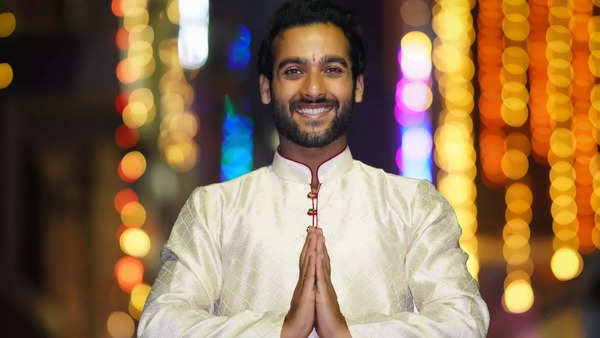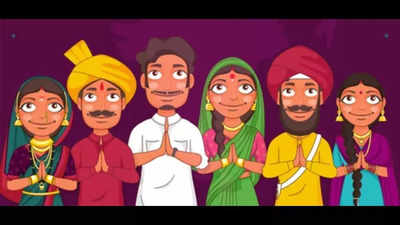India is a culturally diverse country, and this shows in the innumerable different ways that individuals greet one another in its diverse states. As much as “Namaste” is common knowledge, there exist specific greetings per state that signify local tradition and culture. Besides improving communication, learning these salutations builds an appreciation for the different cultures within India. Here’s a look at how to greet people in different Indian states.
Namaste Variations: Namaste is a profound and versatile greeting rooted in ancient Indian culture, embodying respect, humility, and connection. While commonly associated with yoga and meditation, its essence transcends mere words, conveying a heartfelt acknowledgment of the divine within each individual. People from the following state greet with the word that has same meaning but the language, dialect and the tone varies.

Andhra Pradesh – Namaskaram (నమస్కారం)
In Andhra Pradesh, the greeting “Namaskaram” is used, which translates to “I bow to you.” This expression signifies respect and acknowledges the divine within the other person. It is often accompanied by a gesture of folding hands together, enhancing its spiritual essence.
Assam – Nomoskar (নমস্কাৰ)
In Assam, “Nomoskar” is a popular greeting. Like “Namaste,” it conveys respect and goodwill. The word itself is derived from Sanskrit and signifies an acknowledgment of the divine presence in others. This greeting is often used in both formal and informal settings, highlighting Assam’s cultural heritage.
Karnataka – Namaskara (ನಮಸ್ಕಾರ)
In Karnataka, the term “Namaskara” is used similarly to “Namaste.” It signifies respect and acknowledges the divine presence in others. The gesture accompanying this greeting involves folding hands together at chest level, making it an important cultural practice in Karnataka.
Kerala – Namaskaram (നമസ്ക്കാരം)
Kerala also uses “Namaskaram,” reflecting similar values as seen in Andhra Pradesh. The greeting emphasizes respect for others while showcasing Kerala’s rich traditions rooted in spirituality and hospitality.
Madhya Pradesh – Namaste (नमस्ते)
Madhya Pradesh predominantly uses “Namaste” as a universal greeting. This term signifies respect and goodwill towards others, making it an integral part of social interactions throughout the state.
Maharashtra – Namaskar (नमस्कार)
In Maharashtra, people greet each other with “Namaskar,” which conveys similar meanings as its counterparts in other states. It highlights the importance of respect in relationships within Maharashtrian culture.
Odisha – Namaskar (ନମସ୍କାର)
Odisha people also use “Namaskar,” as does most of the rest of India. The word is significant to show respect for others along with keeping traditional values and principles highly entrenched in Odia culture.
Telangana – Namaskaram (నమస్కారం)
Telangana also uses “Namaskaram,” reflecting similar values found in Andhra Pradesh regarding respect for others during greetings.
Tripura – Nomoskar (নমস্কার)
Tripura people also say “Nomoskar,” which is similar to Assam’s greeting. It conveys respect between people and maintains connections with communities.
West Bengal – Nomoshkar (নমস্কার)
Lastly, people in West Bengal also use “Nomoshkar,” whose form is very much like Assam’s but exemplifies Bengali culture’s own nuances in greeting in terms of politeness and warmth towards others.
A different take from the usual greetings: People from the below Indian states prefer to greet one another in a different manner than the typical ‘Namaste’. Many of these greetings are derived by worshipping god or their deep rooted culture.

Arunachal Pradesh – Jai Hind (జై హింద్)
In Arunachal Pradesh, people greet each other with “Jai Hind,” which means “Victory to India.” This greeting reflects a sense of national pride and unity among the various tribes in the state. It is used on formal occasions and celebrations, which reaffirm the unity of citizens.
Bihar – Pranam (प्रणाम)
Bihar’s cultural greeting, “Pranam,” is a ritual of touching the feet of seniors in request for their blessings. The practice focuses on respect for age and experience, which Bihari people have much esteem for. Greeting with “Pranam” shows humility and acknowledgment of kinship ties, and thus social grace would not be complete without it.
Goa – Dev Borem Korum (देव बोरेम कोरुम)
In Goa, locals greet each other with “Dev Borem Korum,” which means “God bless you.” This greeting reflects the state’s strong Christian influence and signifies goodwill and blessings among friends and family. It is often used in casual conversations, fostering a warm atmosphere.
Gujarat – Jai Shri Krishna (જય શ્રી કૃષ્ણ)
In Gujarat, “Jai Shri Krishna” is a common way to greet others. This phrase invokes Lord Krishna’s name, symbolising joy and celebration. It showcases the cultural importance of Krishna in Gujarati society and is frequently used during festivals and gatherings.
Haryana – Ram Ram (राम राम)
The greeting “Ram Ram” is prevalent in Haryana. It serves as both a salutation and a way to invoke Lord Rama’s blessings. This expression brings about a sense of community and shared values among Haryanvis, reinforcing their cultural identity.
Jharkhand – Johar (जोहार)
In Jharkhand, people say “Johar” as a form of greeting. This term expresses respect towards others, particularly elders. It reflects the tribal culture of Jharkhand, where greetings often carry deeper meanings tied to traditions and community values.
Manipur – Khurumjari (खुरुम्जरी)
The traditional greeting in Manipur is “Khurumjari,” which means “May you live long.” This expression reflects wishes for health and longevity, showcasing the Manipuri people’s warmth towards one another.
Meghalaya – Khublei (खुब्लेई)
In Meghalaya, locals use “Khublei” as a way to say hello. This greeting embodies hospitality and friendliness prevalent among the Khasi people of Meghalaya. It fosters a welcoming environment for visitors and locals alike.
Mizoram – Chibai (चिबाई)
Mizoram greets with “Chibai,” meaning “Hello” or “Welcome.” This simple yet warm expression highlights Mizo culture’s emphasis on hospitality towards guests.
Nagaland – Kuknalim (कुकनालिम)
“Nagaland” greets with “Kuknalim,” which translates to “Good morning.” This phrase reflects local customs that prioritize greetings as essential social interactions among Naga tribe.
Punjab – Sat Sri Akal (ਸਤ ਸ੍ਰੀ ਅਕਾਲ)
In Punjab, “Sat Sri Akal” is a prominent greeting that means “God is the eternal truth.” This phrase reflects Sikh beliefs and serves as an expression of goodwill among Punjabis.
Rajasthan – Ram Ram (राम राम)
Rajasthan shares the greeting “Ram Ram” with Haryana but adds its unique cultural context surrounding hospitality and warmth typical of Rajasthani people.
Sikkim – Tashi Delek (བཀྲ་ཤིས་བྱེད་པ་)
In Sikkim, people greet each other with “Tashi Delek,” which translates to “Good luck.” This phrase embodies wishes for prosperity and happiness among Sikkimese communities.
Tamil Nadu – Vanakkam (வணக்கம்)
In Tamil Nadu, locals say “Vanakkam,” meaning “Welcome” or “Greetings.” This term signifies hospitality and respect towards guests while showcasing Tamil culture’s rich traditions.
Uttar Pradesh – Radhe Radhe (राधे राधे)
In Uttar Pradesh, particularly in Braj region, people use “Radhe Radhe” as a form of greeting that invokes Lord Krishna’s name while expressing affection towards one another.


